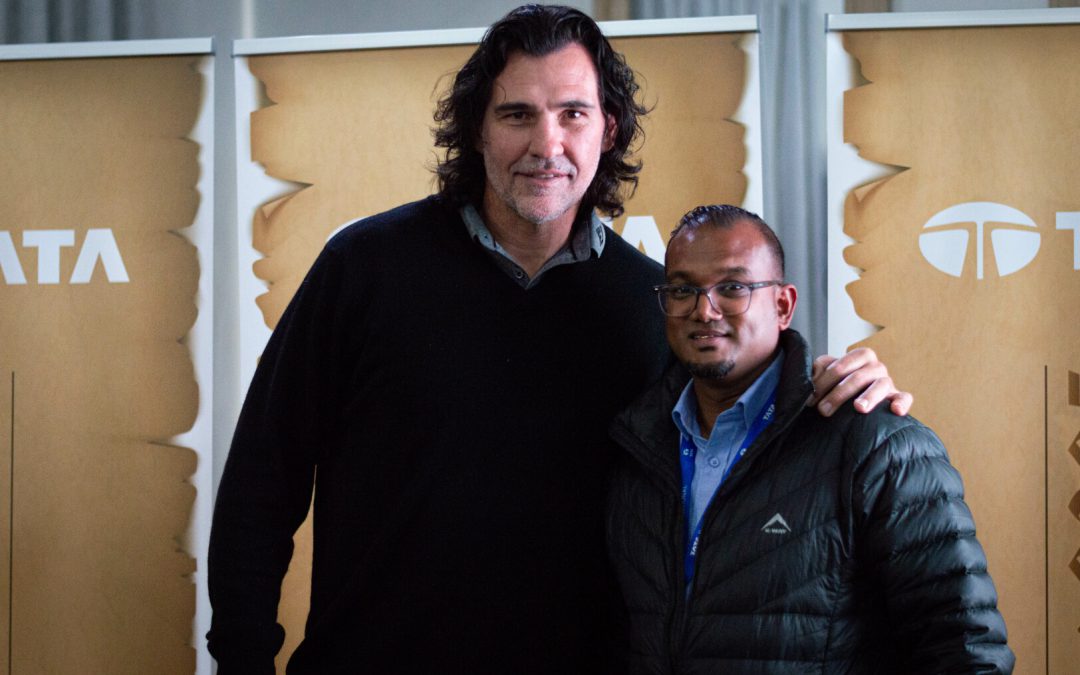In South Africa and across the continent, small and medium enterprises are more than just businesses— they are the backbone of local economies. Yet, too often, they are left to navigate growth alone, under-resourced and overlooked. Tata Africa believes differently, and that transformation happens when big brands back small businesses – not only through product, but through partnership, trust, and real investment in their capacity to thrive.
The stories shared at the 2025 Tata Dealer Conference in South Africa, weren’t just tales of sales success – they were case studies in how local business development happens when a network is built on mentorship, innovation, and long-term commitment and partnership.
From Agri-dealer to commercial truck dealership business: Bethlehem
Naude Visser, and his team in Bethlehem were never meant to be in the commercial vehicle game. Their roots lay deep in the agricultural sector, selling tractors and planters in Bethlehem, Free State. But when they took over a dormant Tata truck dealership, the opportunity to diversify became a turning point.
For seven years, the truck side of the business lingered in the shadows – underinvested, under-resourced, and underperforming. It wasn’t until a visit from Tata leadership – and a renewed partnership conversation – that Naude valued and decided to commit.
Tata Africa didn’t just sell them product – it co-developed a strategy. Naude and team travelled to Tata HQ for preparing a joint plan and undergone product orientation, training, and to rebuild belief in the brand. Six months later, Naude had sold more trucks than it had in the previous seven years combined.
That’s not just a sales spike – it’s the story of a rural business transforming into a competitive, multi-sector operation, backed by targeted investment and trust.
A culture of expertise: Bloemfontein
In Bloemfontein, Trans-Scott Trucks dealership built something rare: South Africa’s top-performing Tata spare parts operation in 2024. This achievement wasn’t about scale or flashy infrastructure, it was about cultivating deep product knowledge, internal mentorship, strong customer connect and a business culture that champions excellence.
The heartbeat of this operation is J.J., a young man who joined straight out of school and was trained by a retired OEM veteran. Through years of guided development, J.J. became a parts expert trusted by clients from all over the country.
Behind the scenes, Dealer Principal and Owner- Kevin Scott created a workplace where staff were empowered to grow – and where he, as a leader, asked them how he could do better.
This is what business development looks like when a people-first philosophy is applied: grooming talent, supporting mentorship, and enabling internal capacity to meet national demand.
Beating the price wars: Commercial Motors Botswana
Operating in Botswana’s hyper-competitive market – flooded with grey imports – Commercial Motors had to do more than sell vehicles. They had to build a business model that would survive, and thrive, on value-added service.
Akhtar Nanuck’s team at Commercial Motors turned to hyper-local strategies: tailored pricing, niche segment targeting, and a relentless focus on after-sales support. With limited access to the tools and infrastructure enjoyed by larger markets, they instead invested in customer relationships.
Today, 70% of their business is referral-driven – proof that word-of-mouth and trust can be more powerful than price.
This is local business development at its core: crafting market-responsive models, investing in service, and building a reputation that brings customers back.
Scaling up strategically: TATA Durban and the Ultra Series
For Shelendra Dwarika and his team at TATA Durban, the launch of the Ultra Heavy Series wasn’t just a new product offering – it was a platform to reimagine their business model.
Through more than 30 live demos, product displays at high-footfall events, and one-on-one engagements with fleet managers, Shelendra turned awareness into conversion. This strategic rollout not only drove up visibility but led to entry into new customer segments. Within a year, the Ultra made up 30% of their sales.
What began as a dealership became a regional brand ambassador. That’s business development through market education, smart outreach, and product alignment.
What These Stories Tell Us
Each of these dealer journeys – Bethlehem, Bloemfontein, Botswana, Durban – proves that developing local businesses isn’t about handouts. It’s about partnership. It’s about enabling access: to training, to belief, to better margins, to targeted finance, to strategy. The unique value preposition Tata Africa SA team brings is creating value through strong participation through business partner /dealership who in terms participate in economic development.
Tata Africa’s dealer network isn’t just a sales channel – it’s a local business development engine. And as they invest in these businesses, they grow the economy in places that need it most.
It becomes clear that when a rural dealership is empowered to expand, when a young school-leaver is mentored into a technical expert, or when a small business is equipped to stand firm against a flood of grey imports, it isn’t just about sales performance or market share – it’s about shifting the very structure of opportunity in Africa. These are the building blocks of inclusive economic development.
In this context, Tata’s brand promise “Built to Back You” emerges not as a slogan, but as a lived reality. One that plays out daily in towns, depots, workshops, and showrooms across the continent.


